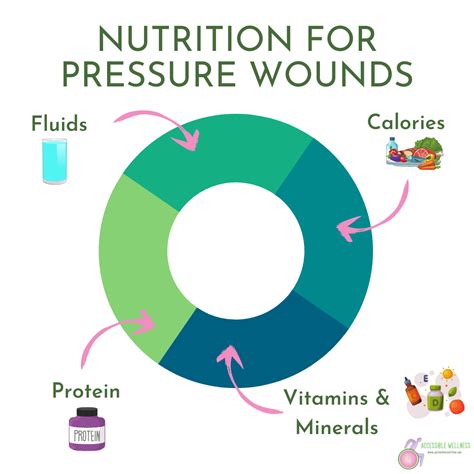10 Wound Healing Protein Requirements For Faster Recovery

Wound healing is a complex and dynamic process that involves various cellular, molecular, and tissue-level events. The process of wound healing can be influenced by several factors, including nutritional status, overall health, and the presence of certain proteins. Proteins play a crucial role in wound healing, and a deficiency in essential proteins can lead to impaired wound healing and increased risk of complications. In this article, we will discuss the 10 wound healing protein requirements for faster recovery.
Introduction to Wound Healing Proteins

Wound healing proteins are a group of proteins that are involved in the various stages of wound healing, including inflammation, proliferation, and remodeling. These proteins can be classified into several categories, including growth factors, cytokines, and matrix proteins. Growth factors, such as platelet-derived growth factor (PDGF) and vascular endothelial growth factor (VEGF), play a crucial role in promoting cell proliferation and differentiation. Cytokines, such as tumor necrosis factor-alpha (TNF-α) and interleukin-1 beta (IL-1β), regulate the inflammatory response and promote the recruitment of immune cells to the wound site. Matrix proteins, such as collagen and elastin, provide a scaffold for tissue regeneration and repair.
Protein Requirements for Wound Healing
The following are the 10 wound healing protein requirements for faster recovery:
- Collagen: Collagen is the most abundant protein in the human body and plays a crucial role in wound healing. It provides a scaffold for tissue regeneration and repair, and its deficiency can lead to impaired wound healing.
- Elastin: Elastin is another important protein that is involved in wound healing. It provides elasticity to the skin and helps to maintain its shape and structure.
- Platelet-derived growth factor (PDGF): PDGF is a growth factor that promotes cell proliferation and differentiation. It plays a crucial role in the proliferation phase of wound healing.
- Vascular endothelial growth factor (VEGF): VEGF is a growth factor that promotes angiogenesis, the formation of new blood vessels. It plays a crucial role in the proliferation phase of wound healing.
- Tumor necrosis factor-alpha (TNF-α): TNF-α is a cytokine that regulates the inflammatory response and promotes the recruitment of immune cells to the wound site.
- Interleukin-1 beta (IL-1β): IL-1β is a cytokine that regulates the inflammatory response and promotes the recruitment of immune cells to the wound site.
- Fibronectin: Fibronectin is a matrix protein that provides a scaffold for tissue regeneration and repair. It plays a crucial role in the proliferation phase of wound healing.
- Laminin: Laminin is a matrix protein that provides a scaffold for tissue regeneration and repair. It plays a crucial role in the proliferation phase of wound healing.
- Transforming growth factor-beta (TGF-β): TGF-β is a growth factor that promotes cell proliferation and differentiation. It plays a crucial role in the remodeling phase of wound healing.
- Keratin: Keratin is a protein that provides structure and strength to the skin. It plays a crucial role in the remodeling phase of wound healing.
| Protein | Function |
|---|---|
| Collagen | Provides a scaffold for tissue regeneration and repair |
| Elastin | Provides elasticity to the skin and helps to maintain its shape and structure |
| PDGF | Promotes cell proliferation and differentiation |
| VEGF | Promotes angiogenesis, the formation of new blood vessels |
| TNF-α | Regulates the inflammatory response and promotes the recruitment of immune cells to the wound site |
| IL-1β | Regulates the inflammatory response and promotes the recruitment of immune cells to the wound site |
| Fibronectin | Provides a scaffold for tissue regeneration and repair |
| Laminin | Provides a scaffold for tissue regeneration and repair |
| TGF-β | Promotes cell proliferation and differentiation |
| Keratin | Provides structure and strength to the skin |

Importance of Nutrition in Wound Healing

Nutrition plays a crucial role in wound healing, and a balanced diet that includes all the essential nutrients is vital for promoting faster recovery. A diet that is rich in protein, vitamin C, and zinc can help to promote wound healing by providing the necessary building blocks for tissue regeneration and repair. Additionally, a diet that is high in antioxidants, such as vitamin E and beta-carotene, can help to reduce oxidative stress and promote the healing process.
Role of Supplements in Wound Healing
Supplements can also play a crucial role in wound healing, particularly in individuals who are deficient in essential nutrients. Protein supplements, such as whey protein and casein protein, can help to promote wound healing by providing a concentrated source of essential amino acids. Vitamin C supplements can help to promote collagen synthesis and improve wound strength, while zinc supplements can help to regulate the inflammatory response and promote tissue regeneration.
What is the role of collagen in wound healing?
+
Collagen plays a crucial role in wound healing by providing a scaffold for tissue regeneration and repair. It helps to promote cell proliferation and differentiation, and its deficiency can lead to impaired wound healing.
What is the importance of nutrition in wound healing?
+
Nutrition plays a crucial role in wound healing, and a balanced diet that includes all the essential nutrients is vital for promoting faster recovery. A diet that is rich in protein, vitamin C, and zinc can help to promote wound healing by providing the necessary building blocks for tissue regeneration and repair.
Can supplements help to promote wound healing?
+
Yes, supplements can help to promote wound healing, particularly in individuals who are deficient in essential nutrients. Protein supplements, vitamin C supplements, and zinc supplements can all help to promote wound healing by providing a concentrated source of essential nutrients.


